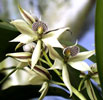|
|
|
|
|
| |
Flasks of
Encyclia fragrans 'MC77' × self |
|
| |
|
|
| |
| Number: |
TN1044 |
| Name: |
Encyclia fragrans 'MC77' × self
|
| Type: |
self (What's that?) |
|
Seed Donor: |
Dale Borders
|
|
Click to Enlarge

Pod Parent Flowers |
Click to Enlarge

Pod Parent Capsules at 182 days |
|
|
|
| |
Culture Notes from Donor: Parent plant: Temperature range I (60-83°F)
For additional origin/habitat information supplied courtesy of
Charles and Margaret Baker, see further below, near the bottom of this page.
|
Temperatures we attempt to use in the lab & greenhouse:
| For Species: |
|
Spring, Summer, Autumn: days average 78°F, nights 62°F; best fit is Intermediate 83-60°F
(Source:
Baker's Web OSC) |
| For Species: |
|
Winter: days average 75°F, nights 56°F; best fit is Cool-Intermediate 75-58°F
(Source:
Baker's Web OSC) |
|
About the name...
| Etymology of |
Encyclia |
|
From Greek "enkyklein" to surround, in reference to the lip enclosing the column.
(Source:
Pridgeon 1992) |
| Etymology of |
fragrans |
|
From Latin "fragrans" smelling agreeably.
(Source:
Brown 1956) |
| Pronunciation of |
Encyclia |
|
en-SIK-lee-ah
(Source:
Pridgeon 1992) |
| Pronunciation of |
fragrans |
|
FRA-granz
(Source:
Hawkes 1978) |
|
If you would like to direct someone to this web page, please copy and paste this URL into your email:
http://troymeyers.com/d?011044
| Flask Information |
| Availability: |
Seed not viable- failed. We were not able to make any flasks. |
| You should: |
Consider placing a "Notify Retries" Request, and if an identical pollination (the same parents) is done again, we'll let you know. |
|
You might also want to:
|
View the seed assay for this item.
View items of the same species.
View items of the same genus.
|
| Ordering Information |
| You are not currently logged in. |
|
You must be a registered user and be logged in to reserve a flask or place a notification request. Please log in:
|
|
|
|
|
|
| |
The origin/habitat information below is supplied courtesy of Charles and Margaret Baker
The following information is based on the name of the plant provided by the donor, and assumes that the name is correct. If the plant has been misidentified, then the following information may not be correct.
This text is copyrighted by the Bakers and may not be reproduced without permission.
ORIGIN/HABITAT: Mexico, most of Central America, much of northern South
America southward to Peru and Brazil, and the islands in the Caribbean
from Jamaica to Trinidad, including the Greater and Lesser Antilles.
Ackerman (1995), however, reported that this orchid has not been collected
on Puerto Rico in 100 years, and visitors to Trinidad report that the
species is now very rare on that island because of heavy collecting
pressure. The species was originally discovered in Jamaica, and plants are
reportedly widespread there except in extremely hot seaside areas. Through
most of its range, Encyclia fragrans is said to be rather common. It grows
as an epiphyte in a variety of habitats, including tall evergreen forests,
wet tropical forests, or montane cloudforest mostly at 1650-4900 ft.
(500-1500 m). In Mexico, this species is considered rather rare. Plants
are reported from the states of Oaxaca and Guerrero, and possibly
Guanajuato and Jalisco, where they grow in oak forests at 650-2800 ft.
(200-850 m). In Costa Rica, the plant is locally common in lowland
tropical rainforests and lower montane forests at elevations of 150-6550
ft. (50-2000 m). Plants are frequently seen in the shaded canopies of
secondary forests and pasture trees. In Ecuador, plants grow on trees all
along the western slopes of the Andes in wet tropical forests and montane
cloudforests at 1950-2300 ft. (600-700 m). In Brazil, this species
inhabits the hot humid lowlands from Amazonas and Pará in the north to the
cooler lowlands of Santa Catarina and Rio Grande do Sul in the south.
More about this information and the Bakers...
|
|
|
| |
|
|
|